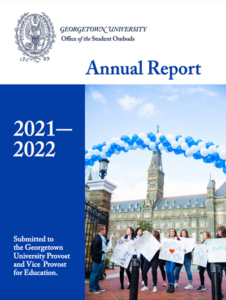Annual Report 2021 -22
About the Ombuds
The OSO serves all Main Campus undergraduate and graduate students, including those in the School of Continuing Studies, Biomedical Graduate Education, School of Nursing, and School of Health. It acts as a confidential, independent, impartial, and informal resource.
Goals of the Annual Report
To demonstrate how the OSO serves the Georgetown community, share systemic issues and concerns raised by visitors, and provide recommendations based on quantitative and qualitative data gathered.
Outreach Activities and Partnerships
The OSO engaged in a range of outreach activities, including meet & greets, student and faculty & staff outreach, and a visit to the GU-Q campus in Doha, Qatar, to introduce its services and role.
Visitor Traffic and Data Tracking
Visitor traffic varied with marked increases in November and April, coinciding with the end of the Fall and Spring semesters. A total of 252 individual visits and mediations were recorded, involving 278 visitors.
Services Provided to Visitors
The services included active listening/coaching, mediation, group facilitation, information sharing, policy clarification, referrals, shuttle diplomacy, issues surfaced to leadership, fact-finding, organizational consultation, and other assistance.
Visitor Issues and Concerns
Issues raised by visitors were categorized into academic environment, wellbeing, and evaluative & peer relationships, among others. The report tracked these issues to identify patterns and offer recommendations for improvement.
Recommendations
The recommendations include encouraging faculty-staff-student dialogue, providing workshops on conflict management and inclusive pedagogy, empowering resources for understanding accommodation policies, and promoting programs to improve communication among roommates.
Visitor Feedback
Feedback was overwhelmingly positive, with suggestions for increasing awareness and improving the visibility of the OSO among underrepresented minorities.
Looking Forward
The OSO plans to expand marketing opportunities, migrate to a more secure data management system, find a more centrally located office space, take advantage of professional development opportunities, and work with campus partners on workshops for effective communication and conflict resolution.
To Download PDF: Click Here

